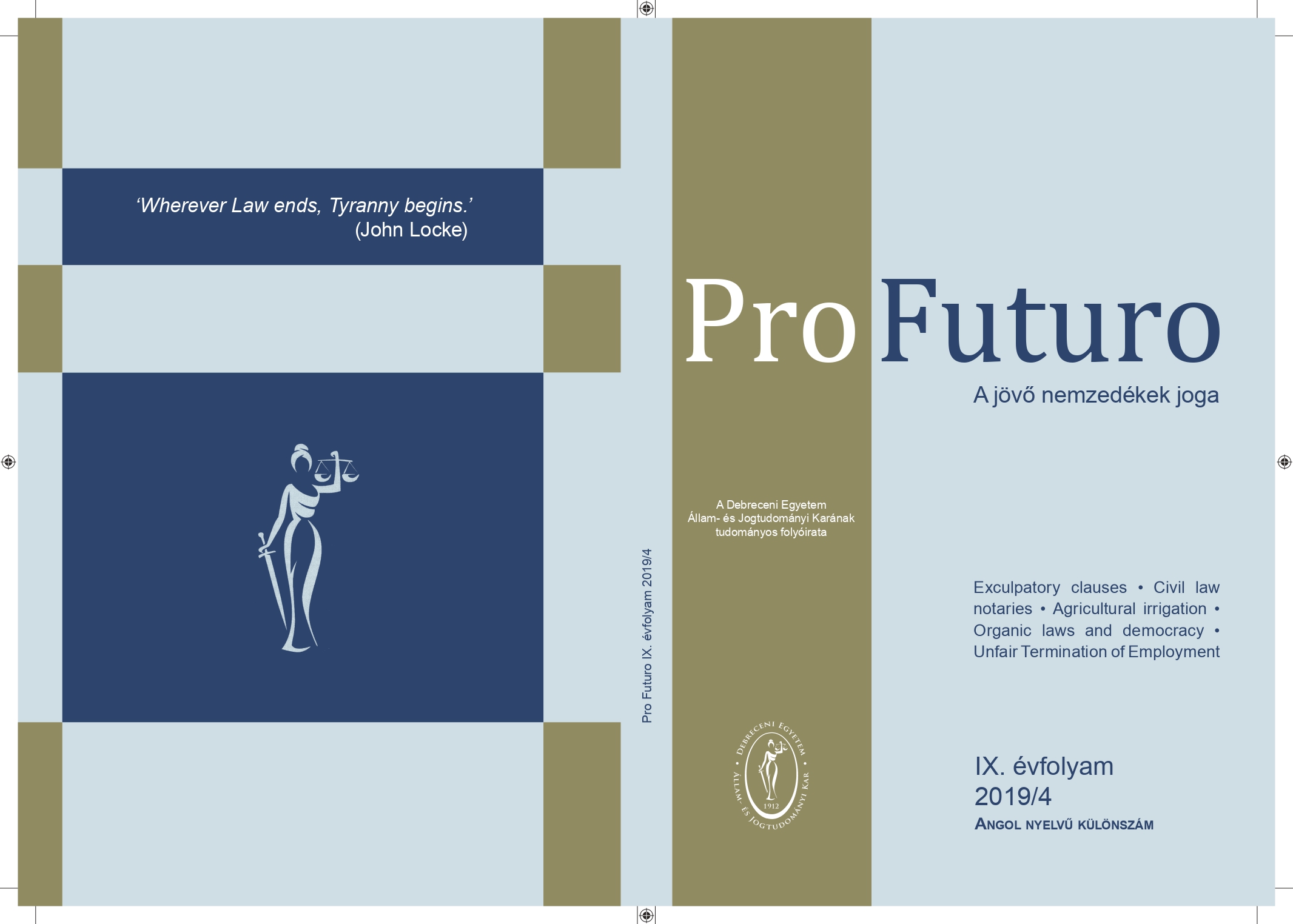Vol. 9 No. 4 (2019): Special Issue
##issue.tableOfContents##
Editorial
Articles
-
Reflections on the validity of exculpatory clauses in light of Section 6:152 of the Hungarian Civil Code
9-24Views:276Section 6:152 of the Hungarian Civil Code (HCC) is an objective cap on the freedom of contract, it is an unconditional (absolute) and minimum protection to which all exculpatory clauses are subject. In this essay, this rule is examined in a wide and complex context. These exculpatory clauses are closely connected to the consent of an injured person or their assumption of risk, or their waiver (especially waiving claims for damages) as unilateral juridical acts. The relationship between this statute and other grounds of invalidity shall also be examined, especially the connection to the invalidity rule of unfair standard contract terms.
PDF546 -
The assertion of fundamental principles relating to civil law notaries in the 21st century with special focus on Hungary
25-45Views:252In our present paper, we tried to introduce the principles of notaries through the Hungarian notary's glasses. We did this through the challenges of the 21st century. Prior to the detailed description of the principles, we introduced the position of the Hungarian notary, where we also discussed the provisions of the Hungarian Constitution. Subsequently, more important legislation on Hungarian notary was mentioned and we discussed the diverse notarial procedures. In this connection, it is important to note that not only the notarial deeds are found in the Hungarian notary's procedures, but also the keeping of notarial registers. The paper deals with the responsibility of notary, the notary's and advertising relationships, the emergence of electronization and digitization. The paper presents the most important principles of notaries, including the principle of independence, impartiality and public authenticity.
PDF464 -
Agricultural irrigation in Hungary, with special regards to the water resources levy and agricultural water supply fee
46-61Views:293The price of the agricultural irrigation is determined by the water resources levy and agricultural water supply fee, which are regulated under Article 15/A. (1) and Article 15/F. (1) of the Act LVII of 1995 on Water Management. A kind of dualism concerning the price of the irrigation can be observed in Hungary. On the one hand, the necessity to irrigate has to be reflected in the price due to the negative impacts of drought on crop production, although irrigation scores low on the hierarchy of water uses. On the other hand, the price must also express the value of water as an irreplaceable natural resource with limited renewable capacity. Based on the analysis of the said provisions, it can be concluded that though allowing derogations from paying for the agricultural irrigation can be justified in many cases, concerns can be raised regarding their uniform application without involving discretion regardless, among others factors, of the differences in the economic situation of the farmers.
PDF445 -
Organic laws and the principle of democracy in France and Spain
62-74Views:260During the last decades, several countries have entrenched a special subcategory of law, which is adopted by stricter procedural rules than that of the ordinary legislative process. These laws are enacted by qualified majority, by the consent of the two chambers of the legislature, and they are subject to mandatory constitutional review before their promulgation, or additional safeguards are implemented in the ordinary legislative process. In this study, I compare the experiences of two crucial legal systems, France and Spain, which provide two different frameworks of qualified law. My aim is to identify the most contested issues from the legal nature of qualified laws, and to seek the proper solutions of these issues, as well as an ideal model of qualified law. My contribution focuses on the relationship between qualified laws and the principle of democracy, and aims to open up new perspectives in this regard.
PDF439 -
Unfair Termination Review During Probationary Period: The Case of Iraq in Light of New Judiciary Trends
75-89Views:382Probation is a trial period to test a new employee for a particular position. It is commonplace for many employers to stipulate that the contract begins with probation based on a mutual agreement with the employee. During the probationary period, more flexible standards are given to review unfair termination. Notwithstanding, a degree of protection insofar as it safeguards employees from the risk of unfair termination shall be granted. Article 37 in the Iraqi Labour Code No. 37 of 2015 permits the employer to test the employee for a maximum of three months if the latter has no professional certificate. The same article empowers the employer to terminate the contract if the employee has failed in the suitability test without setting any standards for such a test. In reviewing cases arising on the basis of unfair termination claims, the judiciary in some developed countries has come up with basic standards of the suitability test. This paper, therefore, attempts to examine Article 37 in the Iraqi Labour Code in light of the new judiciary trends and finally suggests redrafting the mentioned article to be more compatible with the rights of contractual parties.
PDF616

